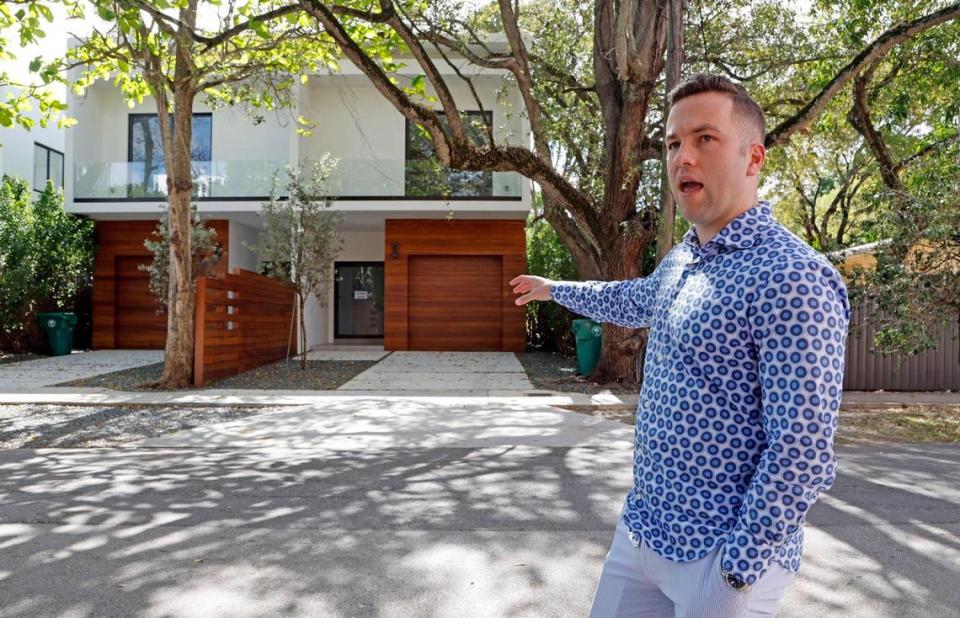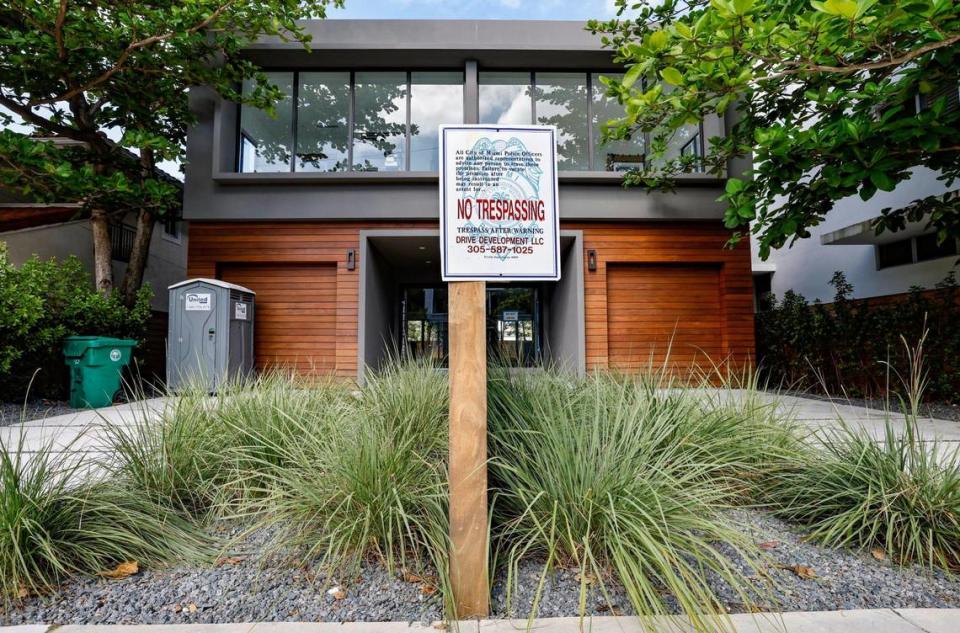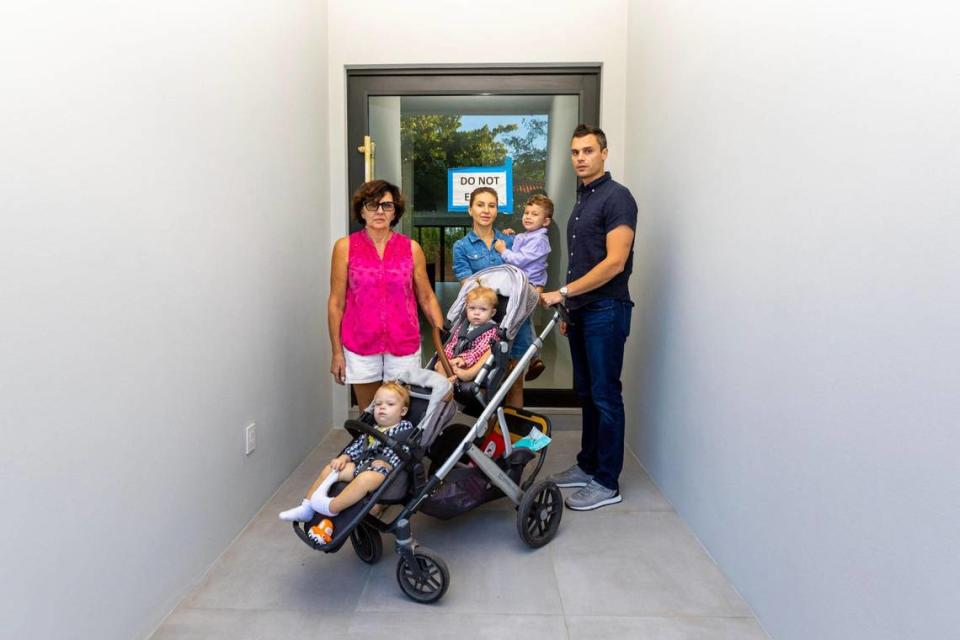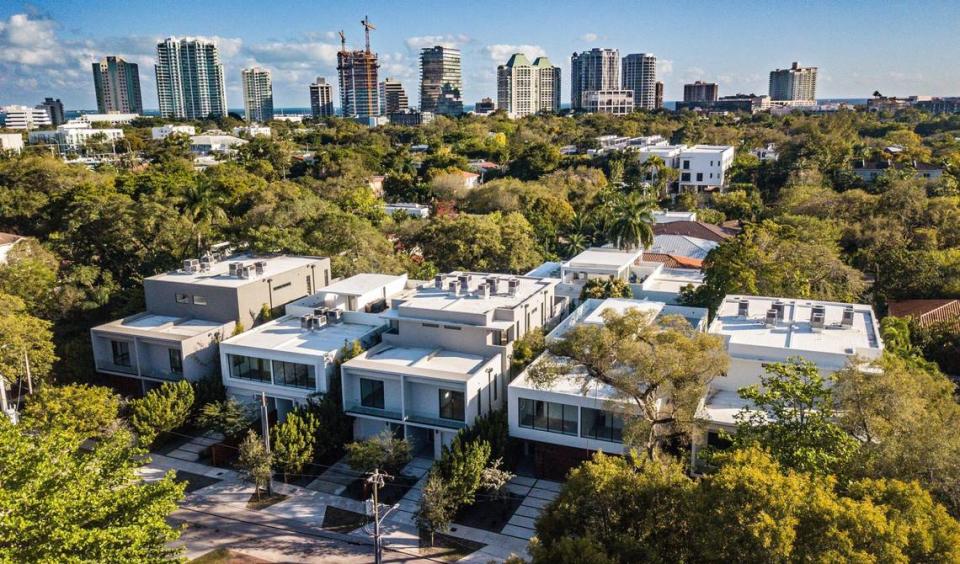$20 million is missing. Frustrated homebuyers warned the city about ‘King of Coconut Grove’
- Oops!Something went wrong.Please try again later.
As lawsuits, foreclosures and eviction notices pile up against a Coconut Grove developer accused of fraud, buyers who have waited years to move into their homes say the entire multimillion-dollar mess could have been averted if city of Miami officials had acted on their complaints.
The case against Doug Cox, his business and live-in partner Nicole Pearl and their companies Send Enterprises and Drive Development is in Miami-Dade Circuit Court under Judge Jennifer Bailey, who in May appointed receiver Alan Fine to follow the trail of some $20 million in missing money.
“We are continuing the forensic work to answer the question of where did the money go,” Paul Singerman said at a hearing Tuesday. He is serving as Fine’s attorney. Two of Cox and Pearl’s bank accounts contain a total of $250. Fine’s team is searching for more. “I’m highly confident we will not have all the answers.”
Cox, who calls himself the “King of Coconut Grove,” owns two dozen properties worth about $70 million in today’s market, including prime vacant lots and 12 nearly finished townhouses on Coconut Avenue. Cox and Pearl have collected $15 million in deposits from buyers since 2018, Fine said. None of them have moved into the homes Cox promised to build as he perpetually postponed their closing dates.

READ MORE: They bought their dream homes from the ‘King of Coconut Grove.’ They still can’t move in
Double and even triple purchase contracts continue to come to light as buyers claim in lawsuits that Cox and Pearl hid the fact they were signing deals for properties with existing contracts. As real estate values soared, unsuspecting buyers signed contracts for higher prices and paid higher deposits that did not go into escrow but into the pockets of Cox and Pearl, lawsuits allege. The house at 2960 Coconut Ave. has had four contracts on it, three currently, with deposits ranging from $500,000 in 2020 to $1.52 million in January.
“It all goes back to the city of Miami,” said Kevin Ware. He and his family have been waiting two years to move into the townhouse they bought. “Our government officials didn’t create Doug and Nicole, but they certainly enabled them. If they’d done their jobs we wouldn’t be in this impossible position and Doug and Nicole would have been stopped before they deceived additional buyers.”

Buyers began complaining to the city’s building department and Miami Mayor Francis Suarez when Cox ignored a 2021 Stop Work order and the city didn’t enforce it, allowing him to continue construction on an unapproved design plan for more than a year. They warned the city Cox was not abiding by their contracts and showing the houses to other buyers. They sent emails, made phone calls, requested meetings. Finally, solutions were proposed at a meeting with Suarez and city officials in March, but nothing came of it. The city said its hands were tied and communication ceased.
“We tried to fix this problem with the city long ago and before it blew up,” said buyer Michael Coyne. “Why didn’t they listen? Why the lack of will? Now, it’s in receivership.”
Cox and Pearl received about $47 million from lenders and investors, which includes $9.2 million from two companies that claim in lawsuits they got conned in a brazenly fraudulent plot: Cox and Pearl, seeking cash last fall, impersonated an Altamar Financial Group loan manager in emails, messages and on fake documents with forged signatures to vouch for their spotless creditworthiness. This way, the suits allege, the new lenders would not know Cox and Pearl had negotiated multiple forbearance agreements with Altamar to postpone overdue mortgage payments.
Cox and Pearl owe more than $72 million to creditors, estimates Fine, whose team is tracking the money that is unaccounted for.
Ran out of cash to complete closings
Cox, who declined to answer questions from the Herald on Tuesday, has locked out Coconut Avenue buyers who put down sizable deposits two, three, even five years ago by failing to complete inspections and obtain certificates of occupancy, records show. Cox hasn’t closed a house sale since 2019 and his lawyer Michael Schlesinger said he “ran out of money” and could not clear debts to complete closings.
“It shows how premeditated this entire scheme was,” Ware said. “Taking double and triple deposits, requesting forbearances and lying to buyers, lenders and investors — lying to everyone every day.”

Now, as Suarez travels the country running for president, while being investigated by the Miami-Dade State Attorney and Commission on Ethics and Public Trust for his dealings with another Grove developer, Cox’s buyers in Miami feel forgotten. They fear they will lose their homes to Altamar, the Miami private lender that lent Cox $34 million and has foreclosed on the Grove properties Cox put up as collateral.
Fine inquired last week whether the original buyers would be willing to pay the current market price — double their contract prices, which ranged from $1.2 million to $1.8 million — to obtain their houses. They were taken aback by the proposal, and hope their contracts will be honored.
READ MORE: Real estate contracts tend to favor developers. What homebuyers should watch out for
As Fine prepares to sell Cox’s properties at market value, Singerman acknowledged Tuesday that the receiver has “a fiduciary duty to deal with the contract holders. It’s complicated, it’s difficult and it has thorny legal and equitable issues,” he said
Fine also has concerns about the loans made to Cox and lenders’ and equity investors’ due diligence. Altamar has imposed a 24 percent interest penalty.
“We’re looking carefully at quite a few of the loans,” he said. “We have some very unusual numbers that are calling our attention.
“There’s going to be a shortfall. If Altamar can reduce its default interest, that would be a benefit to everyone.”
Schlesinger said Cox and Pearl “dispute any accusations of criminal wrongdoing and would object to the sale of any lots.”
Buyers tried to address issues with city of Miami
If only city officials had scrutinized Cox and acted as a watchdog for citizens, things would be different, said buyers, who also took their complaints to the FBI and the Miami-Dade State Attorney’s fraud unit, who said they needed more evidence of a crime to pursue Cox.

A group of original buyers met with Suarez, city building department chief Asael Marrero and other staff members on March 30 at City Hall after a Miami Herald story revealed the extent of their plight with Cox. It was not the first time they sought help from the city and provided documentation of their history with Cox.
“I was confident going into the meeting but I think the city has laughed us off,” said Coyne, who has a family of six with his wife, three toddler children and parents-in-law from Ukraine. He put down $487,500 and signed for a $1.625 million townhouse on Coconut Grove two years ago. Among the six places they have lived since the closing date that Cox promised came and went was a one-bedroom apartment. “I believe the mayor thinks he’s above his constituents and not accountable to taxpayers.”
Two possible solutions were discussed at the meeting: Issuing an emergency ordinance to declare the properties unsafe; they were uninhabited and lacked swimming pool fencing. That would require an OK from the city’s legal department.
Emails from Coyne to the legal department about whether the request for the ordinance was submitted were not answered, and then, as he continued to seek a yes or no answer, not replied to at all, Coyne said. Later, the city told some buyers that the ordinance might require demolishing the houses, so it was not pursued.
Another idea was for the building department to force inspections upon Cox. But Marrero determined he couldn’t do it.
“The City’s authority does not extend to compelling developers or builders to speed up their construction progress beyond what is provided for by law,” the city said in response to Herald questions. “This lack of authority also extends to any interference between the contractual agreements of private parties.”
As for building permits, which Cox would allow to expire and then renew in a relentless cycle, there is no deadline.
“Every permit issued may be extended so long as there has been an approved inspection every 180 days,” the city stated. “Moreover, there is no statutory limitation as to how many times a permit may be extended.”

The buyers also sought disciplinary action against Cox for working through the Stop Work order. The city issued the order because Cox failed to submit plans for the five three-story townhouses he was building on Coconut Avenue. He only submitted plans for the two-story units, he told buyers, because his plans were proprietary and he didn’t want his design stolen.
In its response to the Herald, the city said it addressed the Stop Work order in May 2022 when revised plans from Cox were submitted and audited. But that was only because Ware says he alerted the city about Cox’s violation and hounded the city for seven months to enforce it. During that period, Cox reassured Ware the order wasn’t an impediment because he had smoothed things over with the building department.
At the meeting, the buyers asked Suarez about his relationship with Cox, who contributed $50,000 to Suarez’s re-election campaign in 2020 and $100,000 to Suarez’s 2018 initiative to create a strong mayor position (voters rejected it), campaign finance records show.
Suarez replied he has collected more than $22 million in campaign contributions over the years and doesn’t know all his major donors, buyers said. Cox frequently bragged to buyers about his chummy connections with the city and how he overcame any obstacle by “having a cafecito” with key city officials.
At the time, Suarez was being paid $10,000 per month by another developer, Rishi Kapoor, who had problems with a stalled $70 million project on Commodore Plaza in Coconut Grove. Suarez, who is an attorney and part-time mayor, said he was a paid consultant for URBIN, a subsidiary of Kapoor’s company, Location Ventures, and denied using his office to help Kapoor obtain permits.
Suarez did not disclose the job until questioned by the Miami Herald in May, and he declined to disclose his private client list. The FBI’s public corruption unit is investigating Kapoor’s business dealings and his $170,000 in payments to Suarez. The U.S. Securities and Exchange Commission is investigating Kapoor’s arrangements with investors. Kapoor has another project on tap in Coral Gables while he is a tenant paying rent in a building owned in part by Gables Mayor Vince Lago. Lago recused himself from city commission votes approving the 16-story luxury condo project. Kapoor’s company has been a campaign donor to Lago.
Like Cox, Kapoor was a campaign donor to Suarez, contributing $25,000 to Suarez’s political committee in 2021. And, like Cox, Kapoor was cited for unpermitted construction, his in Miami Beach; the city of Miami Beach issued a Stop Work order Tuesday on a six-story URBIN project on Washington Avenue.
Buyers say they’re disappointed Suarez was not more transparent at the meeting about his outside consulting work with developers in the city.
“The city is a bad actor, too. They stonewalled us, never did what they promised,” Ware said.
The Herald asked Suarez for a response to criticism from buyers but the city’s only response was the statement from the building department.
Cox facing eviction from expensive Grove rental
As buyers worry about the fate of their dream houses, Cox and Pearl are being pummeled on several fronts.
Singerman told Judge Bailey he will ask her to hold them in contempt of court if they don’t hand over documents he’s been requesting since June 5.
Cox is named in a foreclosure complaint by Fuse Group, a Fort Lauderdale-based private real estate lender, for default on a $4.91 million loan that he used to purchase uncompleted condos at 2961-2967 Bird Road.
Cox’s landlord is evicting him, Pearl and their three children from the house they were renting for $12,000 per month on Inagua Street in the Grove — just down the street from the house on Shipping Avenue that Cox told buyers he was building for himself. They’re also being evicted from their Coral Gables office. Pearl is an attorney and licensed real estate agent.
Phillip Sylvester, a real estate investor from Chicago who originally hired Cox to build homes in 2014 and then formed a joint venture with Cox in 2019 to build more homes, says Cox owes him $7 million. Sylvester filed an emergency motion for a receiver after reading the Miami Herald article, claiming Cox double-crossed him, violated their agreement and shut out buyers. Sylvester’s lawyer, Marcos Jimenez, compared Cox’s transactions to a ”Ponzi scheme” in a hearing.
Cox and Pearl were sued for fraud by LV Lending for $6 million and investor Cocogrove Phase 2 for $3.2 million. Both companies allege Cox and Pearl misrepresented their financial situation when they pretended to be an Altamar employee and supplied falsified documents showing they were up to date on their loan from Altamar.
Fine hired real estate broker and investor Vivian Dimond to collaborate with engineering firm MEP and its president, Katrina Meneses, to finish inspections and acquire certificates of occupancy for the townhouses. Meneses had been hired by Cox, but she said she has been stymied by Cox and unable to complete inspection reports.
Altamar’s attorney, Mitchell Mandler, said he and Dimond “walked the properties” last week in anticipation of marketing them for sale, and “it was time well spent,” he said.


